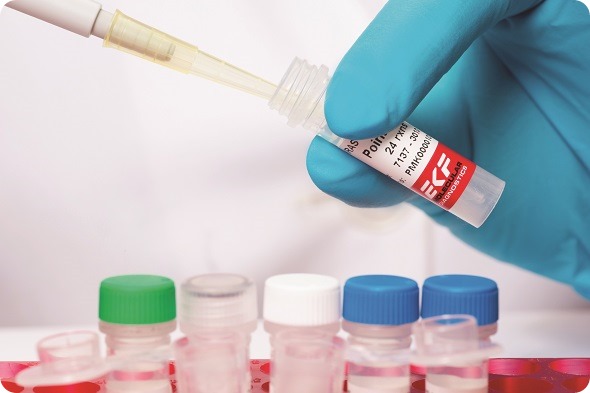EKF Diagnostics, the global diagnostics company, has announced that senior executives from EKF Molecular Diagnostics including CEO, Andrew Webb, will be present at the Association for Molecular Pathology (AMP) annual meeting on booth 1028, to discuss with delegates the predicted outcomes of its research collaboration with Massachusetts General Hospital (MGH). Under the two year agreement, EKF Molecular will develop high sensitivity assays for the detection of genetic variation in circulating tumour cells (CTCs), using its PointMan™ DNA enrichment technology. MGH will clinically validate PointMan in lung, breast and skin cancer, using CTCs isolated from a patient’s blood by MGH’s CTC-Chip instrument.

PointMan™ provides a reliable and highly sensitive determination of the presence or absence of a mutation in the DNA sequence. Image credit: EKF Diagnostics
Andrew Webb, CEO of EKF Molecular Diagnostics Ltd, commented:
This new work follows the initial pilot studies conducted by MGH which suggested that PointMan can detect three mutant alleles in a background of 30,000 wild-type alleles, isolated from CTCs and circulating cell-free DNA. My colleagues Gary Dowthwaite, Product Manager, and Victoria Wilson, Business Development Manager and I are looking forward to discussing the potential opportunities to improve the clinical management of patients, offered by this further collaboration with MGH.
For more information on EKF Diagnostics, please visit www.ekfdiagnostics.com.
About EKF Diagnostics
EKF Diagnostics Holdings plc which includes the EKF Diagnostics, EKF Molecular, Stanbio Laboratory, Separation Technology Inc, Diaspect and Selah Genomics brands, specializes in the development, production and worldwide distribution of point-of-care blood analyzers for use in the detection and management of diabetes, anemia, lactate and kidney related diseases. Its new Molecular division focuses on molecular and companion diagnostics. EKF products are sold in more than 100 countries around the globe, offering over 30 specialist product lines across its brand portfolio.
Point-of-care diagnostics: EKF Diagnostics’ expertise covers the entire in vitro diagnostics chain, from fermentation and enzyme production, to liquid reagent manufacture, design and building of world-class diagnostic devices, and distribution of rapid test kits for infectious diseases and pregnancy. The EKF analyzer range is used widely in GP surgeries, pharmacies, blood banks, sports clinics, hospitals and laboratories for glucose, lactate, hemoglobin, hematocrit and HbA1c measurement.
Companion Diagnostics: In March 2013 EKF set up a new division to focus on molecular and companion diagnostics - EKF Molecular Diagnostics develops technologies for cancer gene detection. Through its acquisition of UK-based 360 Genomics and by offering innovative products with the potential to change current DNA extraction and detection practices, EKF is addressing the fast growing companion diagnostics market.
EKF Diagnostics’ strengths lie in its multi-national research and manufacturing facilities, teams of experienced analysts and engineers in Germany, Ireland, USA and the UK, and a board led by some of world’s foremost authorities in medical diagnostics.
About PointMan™
PointMan™ provides a reliable and highly sensitive determination of the presence or absence of a mutation in the DNA sequence. Mutations are associated with diseases such as cancer and importantly the patient’s response to treatment, known as personalised healthcare.
PointMan™ works by targeting the PCR (polymerase chain reaction) towards the mutant sequence whilst suppressing the amplification of the non-mutated (wild type) sequence and this means that these enriched samples contain artificially high levels of mutated DNA, significantly enhancing detection. This drives the sensitivity of the PointMan™ technology far beyond existing PCR technology (PointMan™ can detect 1 mutant gene in 100,000 normal gene copies against the nearest technology that detects 1 in 100).
The efficiency of PointMan™ therefore maximises the use of smaller biopsy samples as well as allowing multiplexing of mutations in a single test rather than many individual tests as current competing technologies do.